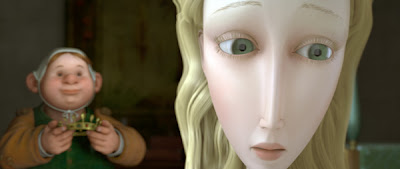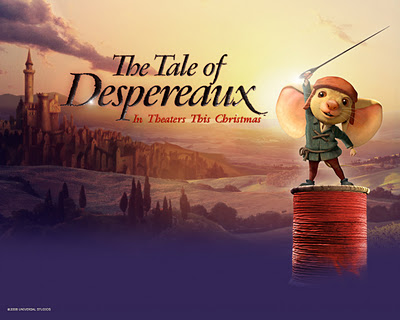This is a guest review by Robert Poteete.
Out the gate, this movie shows a lot of promise with great animated sequences. There were plenty of visually interesting scenes, such as a giant soup-making Rube Goldberg machine, and an advisor spirit composed of vegetables. The movie also features a rat protagonist who breaks the stereotype of ‘rats are evil,’ and features a mouse protagonist who breaks the stereotype of ‘mice are cowardly.’ And Sigourney Weaver narrates.
But…
The story centers on rescuing a princess, and in a fairly banal way—there is no self-conscious humor at the fact that the passive princess isn’t much of a character, but rather an object of rescue. Oddly, while the princess-rescuing contains the climax, the central conflict of the story resolves through largely unrelated means. This begs the question as to why have a rescue the princess plot at all.
In summary of a convoluted plot, with liberal spoilers: The good rat Roscuro falls into the queen’s sacred soup, which apparently gives her a fatal heart attack. The king then falls into melancholy, which leads the kingdom to suffer bad weather,
Fisher King style. The king’s daughter, a Princess named Pea (in the credits, but if she referred by any name other than Princess in the movie I must have missed it), helplessly complains about her father’s melancholy and the weather. Meanwhile, a brave mouse named Despereaux is born, and he chafes against a mouse society which prizes meekness and cowardice. We are also introduced to an overweight swineherd turned servant girl, Miggory Sow, who dreams of being a princess.
By reading forbidden books, Despereaux learns tales of chivalric knighthood and fancies himself a ‘gentleman.’ He meets the princess and falls in love with her beauty. He gets himself in trouble with his mouse society, gets banished from the mouse town, and ends up with the good rat Roscuro. Roscuro tries to emulate Despereaux’s bravery, fails, turns evil, and ropes Miggory Sow into a scheme to kidnap the Princess. Despereaux manages to save the princess, with the help of a reformed Roscuro. And in a largely unrelated subplot, a chef manages to recreate the sacred soup and make the king happy again.
If the plot sounds banal, the dialogue adds nothing. The writers follow the school of “tell, don’t show,” and so we hear about five times through narration how Despereaux the brave mouse believes in honor, truth, chivalry, etc., I suppose in case we forget. (I may watch it again, muted, to test the theory that the dialogue adds nothing, and I encourage the reader to try this as well if so inclined). On other occasions the narrator tells us how Despereaux teaches others the virtues of honor, truth, chivalry etc., and we the audience are likewise left out of how exactly he manages to do this.
The movie DOES pass the Bechdel Test, barely. In one scene the Princess spouts some platitudes at a servant seamstress (no name given). And the female protagonist, Miggory Sow, has some dialogue with the Princess.

On the subject of that female protagonist, because she deserves emphasis: the narrator tells us that Miggory Sow wants to be a princess. The animators decided to make Miggory ugly and identify her with pigs. It’s even in her name! Plus, she gets easily swayed into committing evil acts, because in ‘The Tale of Despereaux,’ ugly correlates with evil and propensity for evil. Have the writers not learned the supposed lesson of ‘Shrek,’ wherein ugliness is not a reflection of virtue?
A muddled moral at the end of the film purports to teach the value of forgiveness, because Roscuro the rat forgives the Princess (or vice versa? The movie makes it unclear), and this turns Roscuro back into a good guy after his brief and wildly successful stint of villainy. And the movie has a strange subplot involving a chef who can summon a magical vegetable-spirit, but this subplot does not get much development despite the fact that it resolves the central conflict of the film. How did the chef learn to summon a magical vegetable-spirit? The movie does not say.
The redeeming point of the movie is its lesson against fear. The heroic protagonist, the titular Despereaux, does not feel fear despite the traditions of his mouse society. That same mouse society does not understand his lack of fear, and labels him a threat to their social order. Despereaux is persecuted and punished, but in the end triumphs because of his courage, and returns to his society to teach them his ways.
But another disturbing trope abused by the movie is that while the ostensibly good-guy Mousetown is visually characterized as European, the evil Rat society is cast as strange and dark and cringingly “Oriental,” with a rat snake charmer, a fat rat borne in a litter (made from a skull!), and rat-odalisques serving disgusting food to lounging rat-satraps. (My partner, who watched the movie with me, argues that the rats represent a thinly-veiled parody of Communist Chinese society.)
Overall the movie contains heroic journeys for the three protagonists. By the end, of course, the inherent courage of the mouse and the reluctant goodness of the rat save the princess, but the actions of the peasant girl do not avail her at all. By accident, Miggory’s long-lost father rediscovers her, and she lives a happier peasant life after that, but she lacks any instrumental effect on the plot other than helping the rats kidnap the princess.
Considering ‘The Tale of Despereaux’ with the lens of how it presents sex/gender stereotypes to kids, it is pretty awful. The women are passive victims: male Roscuro tricks female Miggory into evil, she kidnaps the princess only through Roscuro’s direction, and then herself gets captured through trickery. (Miggory later gets saved… by her father. I see a pattern!). The princess’s virtue constantly conflates with her beauty, just as Miggory’s wickedness correlates with her ugliness. The male characters, on the other hand, act and are capable of heroism, and the movie defines them by their deeds.
On reflection, the movie could have easily avoided a large chunk of its offensive usage of sex/gender stereotypes. The titular hero Despereaux could have been female. A female character insisting on herself as a knight would have been more meaningful, as would her bucking a repressive society insisting on her meekness and cowardice. A female Despereaux would have worked better and been more convincing as an allegory for courage.
But I suppose the most damning criticism of the movie, shared by the children of a friend, is that it is boring. Chivalry really is dead! Thankfully.
—–
Robert Poteete lives in Los Angeles with his partner. He is a lawyer, and tries very hard to be honest about it. He loves comics and animation but cannot draw to save his life.



